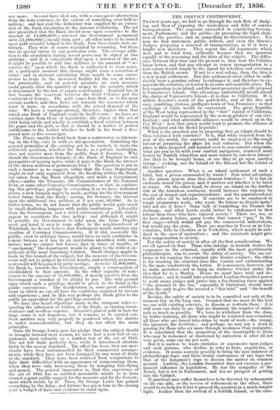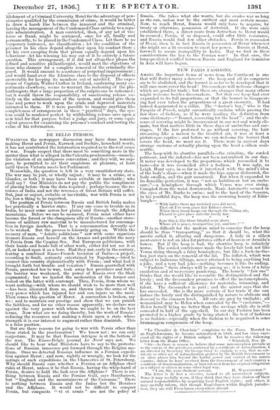THE CONVICT CONTROVERSY.
TWENTY years ago, we had to go through the task first of study- ing and then of exposing the, wickedness and folly of convict transportation. The exposure succeeded in convincing Govern- ment, Parliament, and the public—in procuring the legal aboli- tion of the practice, and in compelling its discontinuance. Yet now we find statesmen, public writers, and even the Queen's Judges, proposing a renewal of transportation, as if it were a bright new discovery. They repeat the old arguments which were put to total rout, evidently because they are ignorant equally of the reasoning and the facts of the subject. The differ- ence between that time and the piesent is, that now the Colonies know better, and that any attempt to renew transportation to a real colony would simply be the signal for rebellion and severance from the British crown. If not to a real colony, then, the idea is a new penal settlement. But this settlement must either be suffi- ciently near a genuine colony to endanger it, and therefore to ex- asperate the colonists, or it must be in some untenantable place. The last suggestion is an island, and the most promising specific proposal is Vancouver's Island. One advantage undoubtedly would attend the choice of Vancouver's Island—it is close to California. It is within deserter's reach of the gold-fields, and of the free and easy, gambling, riotous, profligate town of San Francisco ; so that exchange of visits would be convenient. The great Republic of the West being represented by the "fast" capital of California, England would be represented by the newest product of our civi- lization ; and what admirable alliances would be struck up in the Far West ! how that union would tend to promote the alliance of Old England and the Model Republic !
What is the practical aim in proposing that an island should be
thus colonized with convicts ? It is, that while isolated from the rest of the world, the convicts could be employed on the rough labour of preparing the place for real colonists. But when the place is thus prepared and handed over to non-convict emigrants, what are you to do with your convict navigators, rendered more brutal by Norfolk Islandism and more robust by out-door labour ? Are they to be brought home, or are they to go upon another voyage ; seeking, not the Island of the Blessed but the Island of the Cursed ?
Another question. What is an island settlement of such a kind, but a prison surrounded by water ? Now what advantage to the prison system does that element introduce ? It is but an enclosure round the prison, and it matters not whether it be brick or water. On the other hand, to choose an island on the further side of the American continent, would increase the expense by the cost of transit and superintendence ; and the superintendence would after all be inferior. If convicts are to be employed in rough preparatory work, why waste the labour in distant spots.? why not use it here ? Some talk of tunnelling the Thames for drainage, and what hands could better be condemned to that labour than those who have injured. society ? There are, too, as we have shown before, many works that cannot " pay " in the first stage—which would not pay the commercial undertakers, but would pay the state. There are marshes in Essex or in Lin- colnshire, hills in Cheshire or in Yorkshire, which might be sub- dued to the uses of agriculture ; and the criminals might give that compensation to society. For the safety of society is after all the first consideration. We
are all agreed on that. Those who indulge in brutish desires for vengeance on the criminal, equally with the most gentlemanly philanthropist, aim to secure the safety of society. The one ex- treme is for coaxing the criminal into kinder conduct ; the other is for treating the criminal class like vermin and extirminating it, the more vindictively the better. It is necessary, however, not to make mistakes—not to hang an Ambrose Gwmet under the idea that he is a Marley. Hence we must have trial and de- liberation ; and it would take a hundred London-Scoundrel power to work many judges and juries into a fox-hunting furor against " the prisoner at the bar,' especially if Christians should. have taken the oath to give the accused a " fair trial" and " the benefit of the doubt."
Besides, the safety of society is to be consulted not only at the
moment but in the long run. Granted that we must do the best we can with existing convicts, to disarm or restrain them : it is still more our duty to see that we diminish the number of crimi- nals as much as possible. We have to withdraw from the class, by better training, all those who might be rendered non-criminal, all those who are forced into crime by want of work—the young, the ignorant, the destitute ; and perhaps we may say a word in passing for those who err more through weakness than malignity. It is calculated that the proportion of the incorrigible to those who may be redeemed or chastened by correction is after all not very great, some say six per cent.
But it is useless to waste statistics or arguments upon judges and such persons, who decline to refer to facts, experience, or evidence. It seems scarcely possible to bring the nice balancer of philanthropic logic and these brutal contemners of any logic but that of the hangman's rope to discuss the matter on common ground. Luckily, the London Scoundrel does not exercise a per- manent influence in legislation. He has the sympathy of the Bench, but is not in Parliament, and has no prospect of getting into the Cabinet.
If practical men suffer themselves to be diverted by refinements on the one side, or the reverse of refinement on the other, there would be no help for it but to present the question in a much simpler light. Rather than the revival of a Norfolk Island, or the esta- blishment of a Criminal University, Hotel for the advantage of pen- sionaries qualified by the commission of crime, it would be better to draw a harsh line between the innocent and the criminal, leavino. the management of the Condemned Class entirely to a sepa- rate administration. A man convicted, then, of any act of vie- knee or fraud, might be sentenced, once for all, finally and permanently, to be placed in the Condemned Class. Let there be no temporary sentences, no classification ; let the condition of the prisoner in his class depend altogether upon his conduct there ; let his ever escaping from that prison equally depend upon his behaviour—let his winning his way out of it be entirely a future question. This arrangement, if it did not altogether please the refined and sensitive philanthropist, would meet the objections of those who clamour for a complete removal of the criminally dis- posed. It would amount to a sentence of perpetual imprisonment ; and would hand over the felonious class to the disposal of officers answerable for keeping its members out of mischief. The expe- rience of Captain Walter Crofton in Ireland, confirming many ex- periments elsewhere' seems to warrant the reckoning of the phi- lanthropists that a large proportion of the culpits can be redeemed ; but it would throw the responsibility of sanctioning release en- tirely on the administrators of the system, and would give them time and power to work upon the crude and depraved materials intrusted to them. If it were possible to imagine anything like completeness of arrangement in these " practical" days, the sys- tem could be rendered perfect by withholding release save upon a new trial for that purpose before a judge and jury, or some equi- valent process for examining the prisoner's conduct and testing the value of his reformation.



























 Previous page
Previous page